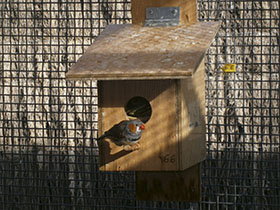Birds of a feather flock together to thrive despite stress: Deakin research
Media releaseAustralia's avian populations may be more resistant to environmental variations, such as climate change, than scientists may have thought, new Deakin University research shows.
A research team at Deakin's Centre for Integrative Ecology (CIE) restricted the diets of zebra finches in a bid to understand how developmental stress early in life impacts on the physiology and behaviour of birds in general.
The results of the study, Developmental stress can uncouple relationships between physiology and behaviour, has been published today in journal Biology Letters and showed the birds adapted to suit their stressed conditions.
Research team member, Associate Professor Kate Buchanan, said the zebra finch, known within the science community as the avian lab rat, had their diets restricted during the first month of life and were then monitored in terms of their behaviour and physiology later in life.
When comparing those exposed to early dietary stress and those that were not, the team found that relationships between metabolism and behaviour were different in the two experimental groups.
"This suggests that birds use their early life experiences to adapt their physiological regulatory systems as adults," Associate Professor Buchanan said.
"This suggests that these animals may be more resistant to stress than we previously thought.
"Stress is part of the natural world, from parasites to unpredictable weather and environmental stress will be exacerbated by the impacts of climate change.
"As our climate changes, birds of the arid zone are predicted to be particularly affected, and as such the zebra finch makes a great model for understanding the effects of long term climate change on Australian birds."
The researchers worked with a large population of domesticated zebra finches which breeds well in captivity. The birds experienced dietary changes to mimic the effects of living in a poor quality environment, which reduced their growth rate during the nestling phase.
Once they had grown to adults, the researchers measured their activity in different contexts, along with their metabolic rate.
This study follows from an earlier study by the CIE team, which used the same group of birds, published in Integrative and Comparative Biology. In the first study, the researchers found that early life stress caused an elevation of metabolic rate and consequently of food intake.
Associate Professor Buchanan said this latest study made a conceptual leap by testing the effects of early life stress on the relationships between physiological and behavioural research.
"The new finding suggests that the way physiology and behaviour interact is determined early in life," she said.
"Our most important finding was showing that food restriction during development changed physiological–behavioural relationships at adulthood.
"To explain that, the relationships seen in control birds between activity levels in an unfamiliar environment and two physiological traits (packed red blood cell volume and metabolic rate) were not present in the stressed birds.
"This change in how physiological and behaviour variables react represent an uncoupling effect of early food restriction.
"This occurred because animals experiencing early life stress showed more variability in their responses. So early life stress increases the variability of physiological responses to environmental challenges.
"Animals experiencing early life stress may therefore have more flexibility in their potential range of responses to challenges in later life.
"Alternatively, the relationship between physiology and behaviour might have been altered because early food restriction changes physiological and behavioural traits in different ways, because these traits very in their sensitivity to stress.
"It seems likely that nutritionally-based developmental stress has provoked changes in the energy budget, by altering feeding rates. Such changes seem likely to fundamentally change the trade-offs between costs of maintenance and movement."
Associate Professor Buchanan said the team hoped to progress their investigations to see how birds adapted to stress over a period of two or three generations.
Share this story
 Survivors: New Deakin research shows birds may be able to adapt better to stress than scientists previously thought.
Survivors: New Deakin research shows birds may be able to adapt better to stress than scientists previously thought.
